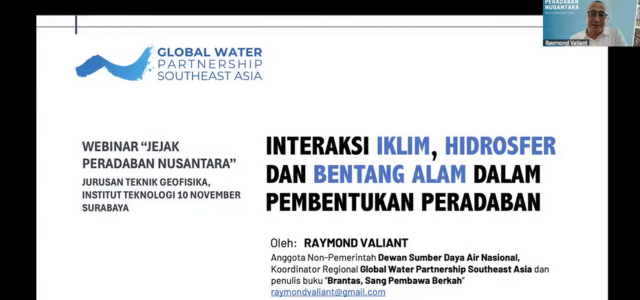Among the speakers was Dr. Raymond Valiant, Member of the National Water Resources Council and Regional Coordinator of Global Water Partnership Southeast Asia, who presented on “Interaction of Climate, Hydrosphere, and Landscape in the Formation of Civilization.” He emphasized that rivers and water systems have long been central to the development of Indonesian civilization, shaping communities, agriculture, and political structures from the time of the early kingdoms along the Brantas and Bengawan Solo rivers.
Dr. Raymond underscored how climate shifts, volcanic activity, and water management influenced settlement patterns and governance. Citing examples from the inscriptions of Harinjing (804 CE) and Kamalagyan (1037 CE), he described ancient water infrastructure as early forms of environmental adaptation and social contracts, the “politics of water” that remain relevant today.

A retention pond used for water storage in the (former) capital of Majapahit, estimated to date from the 14th to 15th century, and believed to be part of the raw water supply system for the community. (photo: Edo, PJT-1)
The webinar concluded with a call to revisit Indonesia’s civilizational roots through scientific research and cultural reflection. By understanding how natural systems shaped the archipelago’s heritage, participants agreed that Indonesia could strengthen its approach to sustainable development and water governance.
Mr Raymond’s presentation available on the panel (right side for desktop view, or at the bottom of the page for smartphone view).
The full recording of the session is now available on Teknik Geofisika ITS YouTube channel.
